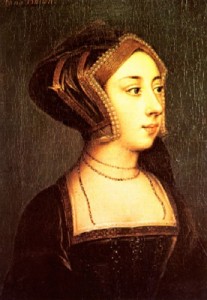 As I have previously said, Sir William Kingston, the Constable of the Tower of London, was ordered to make regular reports to Cromwell regarding Anne Boleyn’s imprisonment in the Tower. Obviously, Anne could say things that her enemies could use against her and for that reason her ladies in the Tower were appointed by Cromwell and were also ordered not to speak to Anne unless Lady Kingston was present to remember or record what was said.
As I have previously said, Sir William Kingston, the Constable of the Tower of London, was ordered to make regular reports to Cromwell regarding Anne Boleyn’s imprisonment in the Tower. Obviously, Anne could say things that her enemies could use against her and for that reason her ladies in the Tower were appointed by Cromwell and were also ordered not to speak to Anne unless Lady Kingston was present to remember or record what was said.
Anne’s Ladies in the Tower
Alison Weir1 lists the ladies appointed to Anne in the Tower as:-
- Mrs Mary Orchard – Anne’s former nurse and the only one who would have been sympathetic to Anne’s plight and shown her love.
- Mrs Stonor (Margaret or Anne Foliot) – Wife of Sir Walter Stonor, the King’s sergeant-at-arms
- Elizabeth Wood, Lady Boleyn – Wife of Thomas Boleyn’s younger brother, Sir James Boleyn of Blickling Hall, and therefore Anne’s aunt. Sir James Boleyn was a supporter of the Lady Mary.
- Lady Shelton – Thomas Boleyn’s sister and mother of Madge Shelton. Weir thinks that Lady Shelton may have turned against Anne after her daughter was used by Anne to keep the King happy (as his mistress) and had had her reputation sullied. Anne had also forced Lady Shelton to treat the Lady Mary cruelly.
- Mrs Margaret Coffin (Margaret Dymoke, also referred to as Mrs Cosyns) – Wife of William Coffin, the Queen’s Master of the Horse, and a Gentleman of the Privy Chamber. The Coffins were related to the Boleyn by marriage but Mrs Coffin had been appointed to spy on Anne in the Tower and was the lady chosen, along with Lady Boleyn, to sleep “on the Quenes palet”2.
- Mary Scrope, Lady Kingston – Sir William Kingston’s wife. She had served Catherine of Aragon and was friends with the Lady Mary.
According to Alison Weir, Anne was also appointed two menservants and a boy.
Cruelly Handled
Anne may have had a Queen’s household and sumptuous lodgings but she was still a prisoner and was surrounded by spies or women who had little sympathy for her. No wonder Anne complained to Sir William Kingston, saying:-
“I thynke [much unkindness in the] Kynge to put seche abowt me as I never loved.”3
Anne Boleyn also complained of her treatment at Greenwich, when she had been arrested:-
“Then she be gan talke, and sayd I was creuely handeled a . . . . a Greweche with the Kynges consell with my lord of Norfolke, that he sayd Tut, [tut, tut!], and shakyng hyr hed iii. or iiij. tymes”4
In her ramblings, Anne also wondered if Henry was testing her:-
“But s]he to be a Quene, and creuely handeled as was never sene; bot I th[ink the King d]ose it to prove me;”5
and hoped that her bishops would speak up for her and the country pray for her:-
“then she sayd, I wo[uld to God I had m]y bysshoppys, for thay wold alle go to the Kynge for me, for I thy[nk the most part of] Yngland prays for me. and yf I dy you shalle se the grettes[t punishment for me] within thys vij. yere that ever cam to Yngland.”6
After pondering this, she then talked of her death, the good deeds she had done in her life and the cruelty of the King who had surrounded her by enemies in the Tower:-
“And the[n, she said, shall I be in Heaven, for] I have done mony gud dedys in my days, bot zit I thynke [much unkindness in the] Kynge to put seche abowt me as I never loved. I showe[d her that the Kyng took them] to be honest and gud wemmen. Bot I wold have had [of my own privy cham]bre weche I favor most.”7
G W Bernard uses Anne’s words regarding her good deeds and going to Heaven as evidence that she did not believe in justification by faith alone, like Martin Luther, but I think that this is reading too much into the ramblings of a woman who feared for her life and kept going from laughter to tears and back to laughter. Anne was trying to hold on to some hope and faith, she was hoping that the King was simply testing her, but was trying to reassure herself that at least she had a place in Heaven if things continued to go wrong. Poor Anne. It is as I read Kingston’s reports in Letters and Papers that I can see the depths of Anne’s despair, her confusion at how on earth she had managed to go from the King’s beloved wife to being a prisoner, her fear regarding her future or lack of it, her horror at her situation, her anger at being surrounded by enemies and her bravery in facing death. There is no way that I can understand what she was going through but I know that it must have been hell on earth. I just hope that Mrs Orchard was able to give Anne some motherly affection at this time and that Anne drew on her faith to keep her going.
Notes
- The Lady in the Tower: The Fall of Anne Boleyn, Alison Weir, p138
- L&P x. 793 Letter from Sir William Kingston to Cromwell, dated 3rd May 1536.
- L&P x. 797 Letter from Sir William Kingston to Cromwell, undated.
- Ibid.
- Ibid.
- Ibid.
- Ibid.